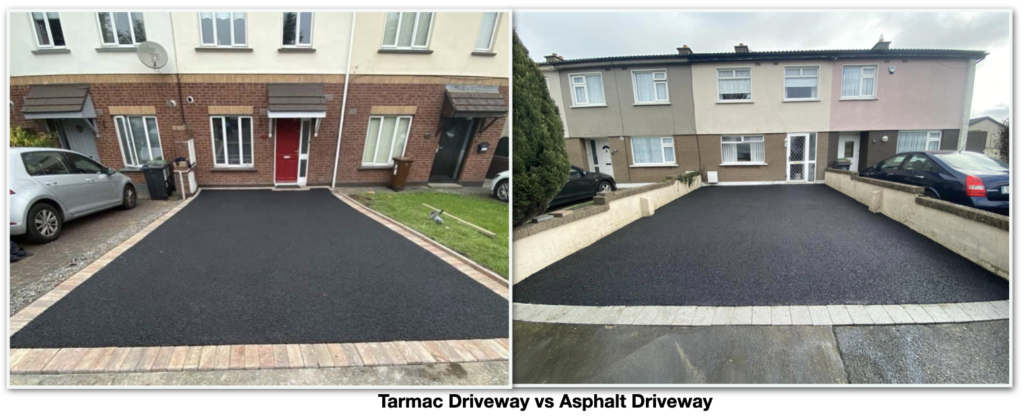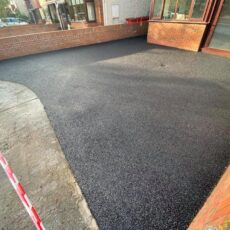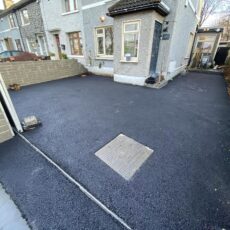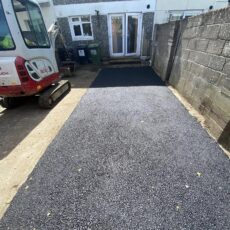Your driveway is a crucial component of your home’s exterior. It serves as the pathway to your property and plays a significant role in creating a positive first impression. To add, a well-paved driveway not only improves the appearance of your home but also provides a safe and functional surface for walking and driving. In Ireland, where weather conditions can be challenging, choosing a driveway material that can withstand the elements is vital.
When it comes to driveway materials, two popular choices in Ireland are tarmac and asphalt. While these paving solutions are similar in some ways, they have distinct differences in terms of durability, cost, maintenance requirements, and aesthetic options. Understanding these differences can help homeowners in Ireland make an informed decision when choosing between tarmac and asphalt driveways.
What Are Tarmac Driveways?
Tarmac driveways, also called tarmacadam, are originally made up of tar and macadam. Nowadays, they are made by combining crushed stones and sand with liquid bitumen. The bitumen acts as a binder that holds the crushed stones and sand together.
What Are the Pros of Tarmac Driveways?
Tarmac driveways offer several advantages that make them a popular choice in Ireland:
Affordable
One of the most significant advantages of tarmac driveways is that they are relatively low-cost compared to other paving materials. The initial installation cost is lower, making them an attractive option for homeowners on a budget.
Tarmac driveways can cost anywhere from €40 to €75 per square meter, whereas concrete driveways can cost €75 to €100 per square meter. Similarly, block paving can also be more expensive than tarmac, with pavers costing €80 to €105 per square meter.
If you want to read more about the cost of tarmac driveways in Ireland, click here.
Weather-Resistant
Tarmac driveways are highly resistant to the unpredictable Irish climate. They can withstand heavy rainfall and temperature fluctuations without significant damage, making them an excellent choice for areas with frequent rain and varying weather conditions.
Quick Installation
They can be installed relatively quickly, minimising disruption to your daily routine. The efficient installation process ensures that your driveway is ready to use in a shorter timeframe.
Low-Maintenance
Tarmacadam driveways require less maintenance compared to other materials. Regular sweeping and cleaning are needed to prevent the build-up of dirt and debris, but repairs may be necessary if the driveway shows any signs of damage.
Easy to Repair
Another advantage of tarmac driveways is that they are easy to repair. If your tarmac driveway sustains any damage, such as cracks or potholes, it can be fixed quickly and cost-effectively.
What Are the Cons of Tarmac Driveways?
While tarmac driveways offer numerous benefits, it’s essential to consider their limitations:
Slippery When Wet
Tarmac driveways can be slippery when wet, which can be a concern when it rains or snows. The smooth surface of tarmac, combined with water or ice, can create conditions that may affect traction for both vehicles and pedestrians.
Potential for Cracks and Damage
Tarmac driveways may crack and get damaged over time. This can be prevented by ensuring proper installation through a reputable tarmac driveway contractor, regular maintenance, and taking steps to avoid heavy vehicle traffic or sharp objects on the surface.
Susceptibility to Oil Damage
Tarmac is susceptible to staining and deterioration when exposed to oil or petroleum-based substances. When vehicles leak oil or gasoline onto the tarmac driveway, the oil can penetrate the surface and cause discolouration and even structural damage over time.
Environmental Concerns
Tarmac is a petroleum-based product, making it non-environmentally friendly. While some contractors offer recycled tarmac, not all do. So, it’s essential to ensure you work with an eco-conscious driveway paving company if this is a priority for you.
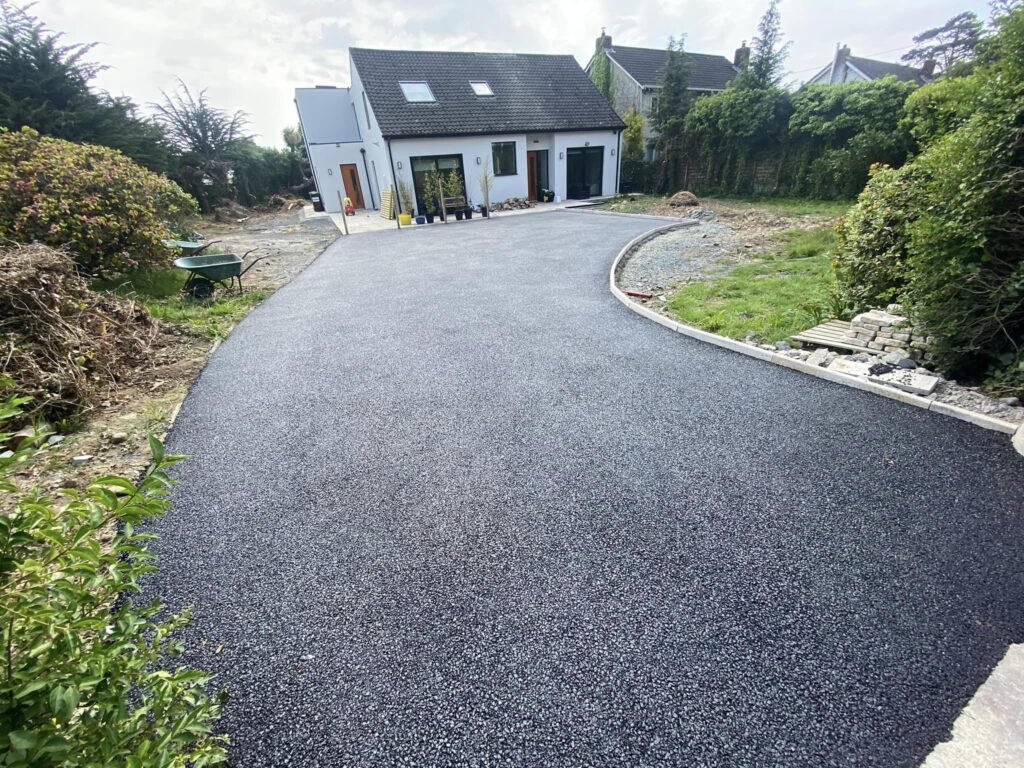
What Are Asphalt Driveways?
Asphalt driveways are primarily composed of crushed stones, rocks, sand, and bitumen. However, the bitumen in asphalt is typically a lighter colour than the bitumen in tarmac.
What Are the Pros of Asphalt Driveways?
Asphalt driveways offer several advantages that make them a popular choice for homeowners in Ireland:
Cost-Effective
Compared to other paving materials, such as concrete or pavers, asphalt driveways tend to have a lower initial installation cost. This makes it an attractive option for homeowners on a budget.
Durable
Asphalt driveways can withstand heavy loads and regular vehicle traffic without easily cracking or crumbling. When properly maintained, an asphalt driveway can last for decades, providing a reliable and long-lasting surface for your vehicles.
Smooth Surface
Driveways made of asphalt provide a smooth and seamless surface, which can enhance the driving experience. The absence of joints or gaps makes it easier to navigate vehicles or even clear snow during winter.
Variety of Colours and Styles
Asphalt driveways offer a wide range of aesthetic options. Homeowners can choose from various decorative aggregates, patterns, colours, and finishes to create a customised look that complements their home’s design.
What Are the Cons of Asphalt Driveways?
While asphalt driveways have several advantages, they also have some limitations:
Require Regular Maintenance
While asphalt driveways are hard-wearing, they require regular maintenance to keep them in optimal condition. This includes periodic sealing to protect against moisture, UV rays, and other external factors. Without proper maintenance, the surface can deteriorate over time.
Susceptible to Temperature Variations
Extreme temperature fluctuations can affect the performance of asphalt driveways. In cold climates, freezing and thawing cycles can cause cracking and damage. In hotter regions, prolonged exposure to heat can lead to softening and rutting. Proper installation and regular maintenance are essential to mitigate these issues.
Vulnerable to Oil and Chemical Stains
Like tarmac, asphalt driveways are susceptible to stains from oil, gasoline, and chemicals. Spills should be cleaned up promptly to avoid permanent discolouration. Sealcoating can provide an added layer of protection against these stains.
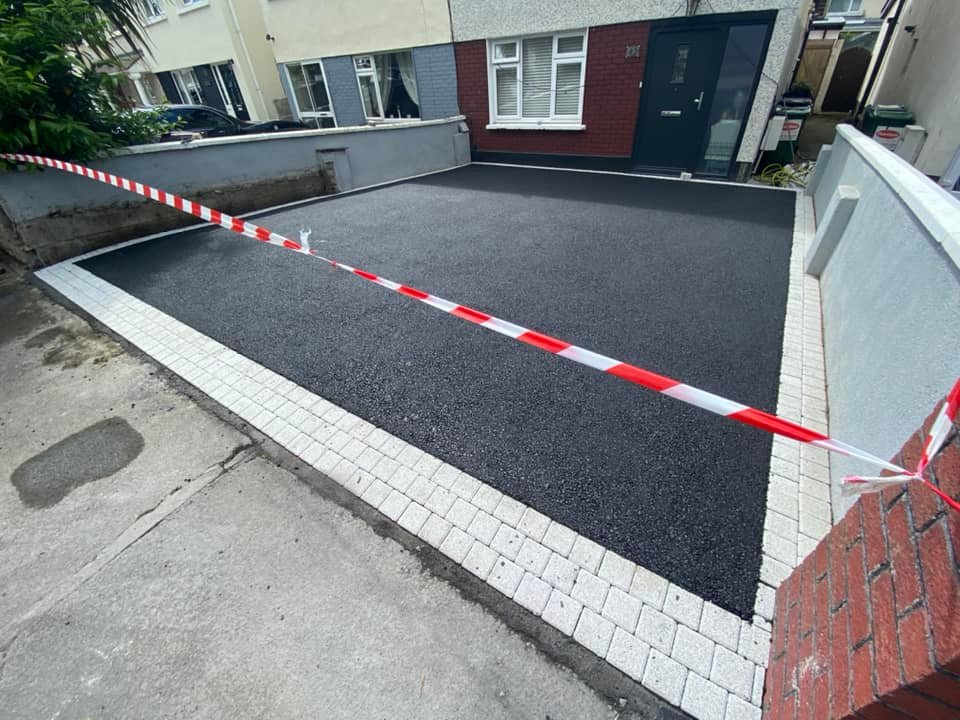
Tarmac vs Asphalt Driveway – Which Is Better?
Here’s an overview of how tarmac and asphalt fare in various aspects:
|
Feature |
Tarmac |
Asphalt |
| Durability | Less durable | More durable |
| Cost | Less expensive | More expensive |
| Maintenance requirements | More maintenance | Less maintenance |
| Color and customization options | More flexible | Less flexible |
| Slip resistance | Less slip-resistant | More slip-resistant |
| Lifespan | 15-20 years | 20-25 years |
| Overall | Good option for budget-minded homeowners who want a driveway that can be customized | Good option for homeowners who want a durable driveway that requires less maintenance |
Durability and Weather Resistance
Both tarmac and asphalt driveways exhibit strong durability and excellent weather resistance. However, there are a few factors to consider when comparing their performance in Irish conditions.
Performance in Varying Climate Conditions in Ireland
Both tarmac and asphalt driveways are designed to resist heavy rainfall, temperature changes, and freezing conditions, ensuring their durability over time.
Which Withstands Heavy Rainfall Better – Tarmac or Asphalt?
Both have good water resistance. Proper installation and maintenance, including ensuring efficient drainage, are essential for preventing water pooling and potential damage.
How Do They Fare in Freezing Temperatures?
Asphalt driveways tend to have better frost resistance due to their flexibility. The expansion and contraction properties of asphalt help it withstand freezing temperatures without significant cracking or damage. Tarmac driveways are also resilient but may require extra care and maintenance during cold weather conditions.
Is Asphalt More Durable Than Tarmac?
Ultimately, both tarmac and asphalt driveways are durable and can withstand the changing weather conditions in Ireland. However, asphalt driveways are more flexible and resistant to cracking in extreme weather conditions like frost.
The flexibility of asphalt is due to its composition and ability to expand and contract with temperature changes. Additionally, asphalt driveways offer better resistance to water penetration, which can cause damage and surface deterioration over time.
Tarmac and Asphalt Driveway Cost And Installation
The cost and installation process are crucial considerations for homeowners. So, let’s compare the two materials:
Initial Installation Costs
Tarmac driveways generally have a lower initial installation cost compared to asphalt driveways. The price varies based on factors such as driveway size, site preparation, and labour requirements.
Long-Term Cost Analysis and Considerations
While tarmac driveways have lower initial costs, asphalt driveways tend to have a longer lifespan and may require fewer repairs over time. Additionally, asphalt is recyclable, which can result in cost savings for the homeowner.
Installation Time and Process Comparison
The duration of the installation process will depend on the driveway size and complexity. However, tarmac driveways are generally known for their quick installation process, allowing homeowners to enjoy their newly paved surface sooner. One reason for this is that tarmac driveways can be laid onto an existing surface, reducing the installation time and price. On the other hand, asphalt driveways require a more detailed installation process, including proper grading, compaction, and layering.
Are Tarmac Driveways More Cost-Effective Than Asphalt Driveways?
As mentioned earlier, the driveway installation cost may vary based on various factors, such as the driveway’s size, the property’s geography, and specific job requirements.
As a general estimate, the initial cost of installing a tarmac driveway in Ireland can range from €40-€75 per square meter. In contrast, the initial cost of installing an asphalt driveway can range from €60-€90 per square meter.
While tarmac driveways are generally less expensive to install initially, the long-term benefits and durability of asphalt driveways may offset this higher upfront cost. So, homeowners like you should consult with trusted contractors to get a more accurate estimate based on their specific project needs.
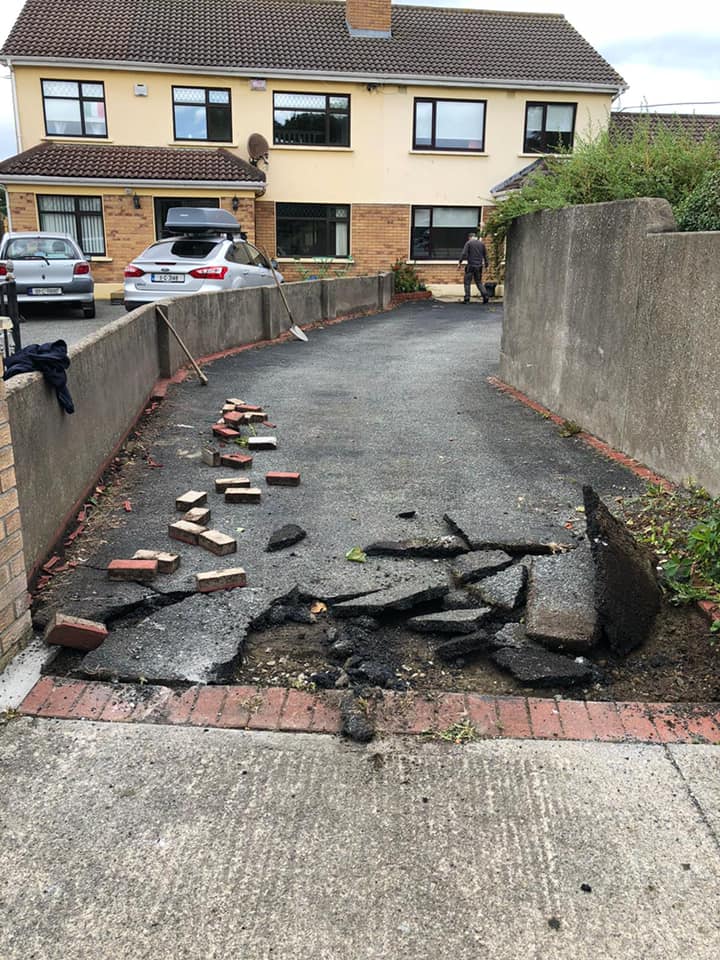
Maintenance and Repair
Regular maintenance is essential for preserving the quality and longevity of your driveway. Let’s examine the maintenance requirements for tarmac and asphalt driveways:
How Much Maintenance Do Tarmac and Asphalt Driveways Need?
Properly maintaining tarmac driveways entail regular cleaning to remove debris and prevent surface deterioration. It’s important to promptly address any cracks or damages by filling them with suitable repair material. Applying a sealant every few years helps protect the surface and extend the driveway’s lifespan.
Like tarmac driveways, asphalt driveways need regular cleaning to prevent staining and maintain their appearance. Resealing the surface every few years helps protect against moisture penetration and UV radiation. Promptly addressing potholes and cracks through patching is crucial to prevent further damage.
Repair Considerations and Potential Expenses
Both tarmac and asphalt driveways may require repairs over time. Tarmac driveways may develop cracks or surface damage, which can be easily filled and sealed. Asphalt driveways may also require patching of potholes or cracks. The cost of repairs will vary based on the extent of the damage and the size of the affected area.
Preventative measures such as crack sealing and seal coating can help mitigate damage and extend the life of both types of driveways.
Aesthetics and Customisation Options
For many homeowners, aesthetics and customisation play a significant role in their decision-making process. If you are particular about your driveway’s design and appearance, read on to learn more:
What Are the Colours of Tarmac and Asphalt Driveways?
Tarmac driveways are typically available in black or dark grey. But they can be dyed in a variety of colours, like red and brown. The range of colour options for tarmac is generally more limited compared to asphalt. Moreover, the colour tends to fade over time, so it is important to choose a hue that you are not too attached to.
Asphalt driveways are typically a uniform grey colour. However, through the use of pigments, they can be customised to match the preferences of property owners. The colour of the asphalt will not actually change, but the pigment will give it the appearance of being a different colour. The amount of pigment added will determine the intensity of the hue.
Can Tarmac and Asphalt Driveways Be Customised to Match the Aesthetics of My Home?
Yes, tarmac and asphalt driveways can be customised to match the aesthetics of your home in various ways:
Colour Options
As mentioned earlier, coloured tarmac and asphalt options are available to complement the overall look of your home. You can choose a colour that matches or complements the exterior of your house or any specific design scheme you have in mind.
Surface Finishes
You can also customise the surface finish of your tarmac or asphalt driveway. Different textures and patterns can be applied to create a unique look that suits your home’s style. For example, you can opt for a smooth finish or a textured surface that adds visual interest.
It is worth mentioning that adding texture creates a non-slip surface. This is a great option if your children or pets play in the driveway. The texture that you choose will depend on the amount of traffic that your driveway receives.
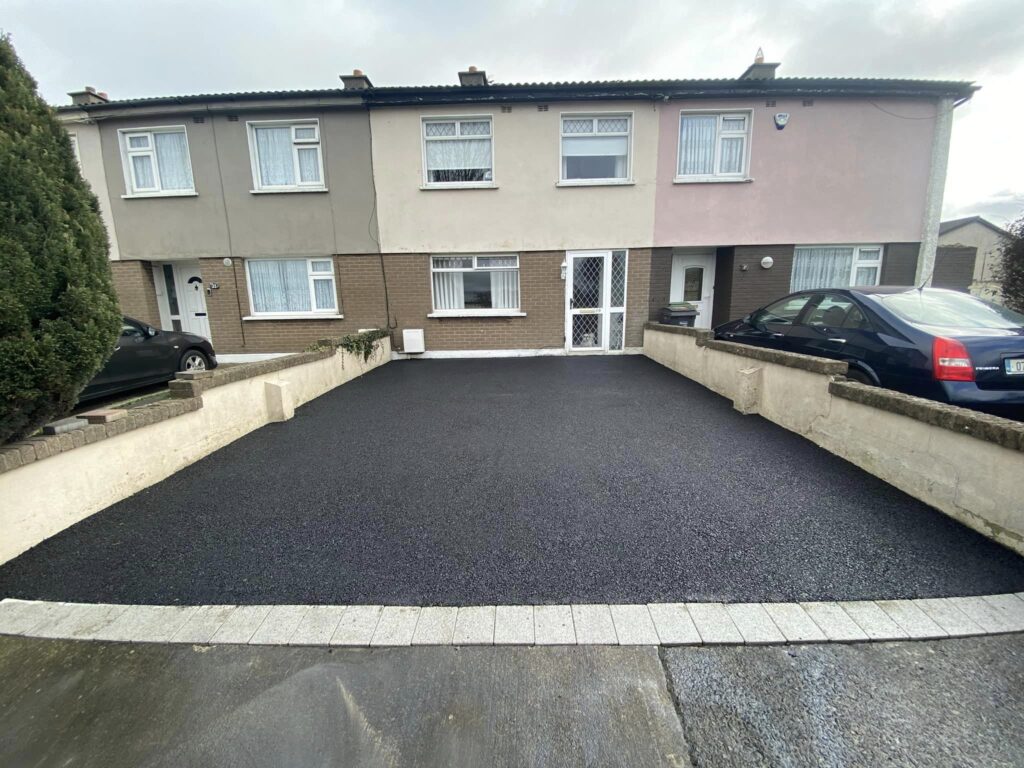
Edging and Borders
Edging and borders can be used to define the driveway’s space and add visual interest. You can choose from various materials, such as bricks, stones, or pavers, to create an attractive border that complements the overall aesthetics of your home.
Stamping
Stamping is a process that uses a mould to create a specific pattern on the surface of the driveway. Textures and patterns can be applied to the driveway’s surface to create a unique and decorative look. This process allows you to mimic the appearance of other materials, such as brick, stone, or tile, without the cost and maintenance associated with those materials. Some popular stamped patterns for driveways include cobblestone, slate, and brick.
While tarmac can be stamped, it is not as common as stamping asphalt. This is because the gravel in the tarmac can make creating a clear and crisp stamp more difficult.
Landscaping Integration
By considering the surrounding landscape, you can further personalise your driveway. Adding greenery, decorative lighting, or other landscaping features along the driveway can enhance its visual appeal and help integrate it seamlessly with your home’s exterior design.
Environmental Impact
Tarmac driveways are made from oil-based products, which can have an environmental impact due to the extraction and processing of crude oil. However, the tarmac industry has made efforts to improve sustainability by incorporating recycled materials into the production process. Using recycled aggregates, such as crushed concrete or asphalt, can help reduce the need for new raw materials and decrease the overall environmental footprint of tarmac driveways.
Asphalt driveways, on the other hand, are known for their recyclability and energy efficiency. Asphalt can be recycled and repurposed, which helps reduce the amount of construction waste and the demand for new materials. Incorporating recycled asphalt pavement (RAP) in the manufacturing process can lead to significant energy savings and reduced carbon emissions. Furthermore, the industry has been working towards utilising sustainable binder technologies, such as warm-mix asphalt, which reduces energy consumption during production.
Tarmac or Asphalt – Which Type of Driveway Is Right for You?
Choosing between tarmac and asphalt driveways ultimately depends on your specific needs and priorities. Consider the following factors to determine which type of driveway is the right choice for you:
Budget
Asphalt driveways typically come at a higher price point compared to tarmac driveways. So, if budget is a primary concern, tarmac driveways are generally more cost-effective upfront. However, it’s essential to assess your budget and weigh the initial expenses against the long-term cost analysis before making a decision.
Durability
Asphalt may be the superior choice if you’re looking for a driveway that will last many years without significant deterioration. Their weather resistance and flexibility make them more durable in varying climate conditions, minimising the risk of cracking and damage. They have a longer lifespan, making them a solid investment for the long term.
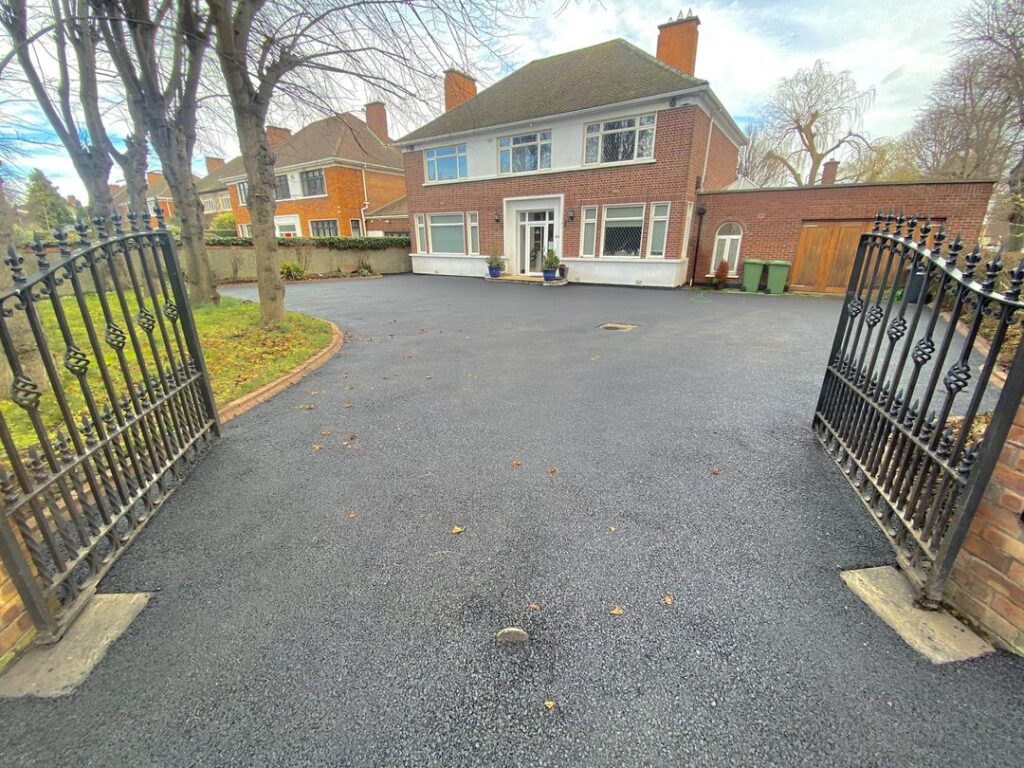
Slip Resistance
In Ireland, the wet and icy weather can be a safety hazard. That’s why it’s so important to have a slip-resistant driveway. With their smooth surface, asphalt driveways may offer better traction, reducing the risk of slips and falls compared to tarmac driveways.
But this is not to say that tarmac can’t be used in places that experience wet and icy conditions. Tarmac driveways can be made more slip-resistant by adding aggregate to the mix, which is why they remain a popular choice in Ireland.
Design
As mentioned earlier, both tarmac and asphalt driveways can be customised to match the aesthetics of your home. You can choose from various colours, textures, and patterns to create a driveway that seamlessly integrates with your home’s exterior. For example, you can dye your driveway a colour that matches your home’s siding or stamp it with a pattern that mimics the look of brick or stone. You can also add edging or landscaping to further make your driveway unique.
Maintenance
Both tarmac and asphalt driveways require regular maintenance to ensure their longevity. This includes sealing the driveway surface to protect against cracks and potholes, as well as occasional repairs. However, tarmac driveways may require more frequent maintenance due to the potential for gravel migration or the need to address any loose stones.
Local Regulations
Before choosing a paving material, you must check for any local regulations or homeowner association guidelines that may impact your choice of driveway material. Some areas may have specific requirements or restrictions regarding the use of tarmac or asphalt driveways.
By considering these factors, you can make an informed decision and choose the right type of driveway for your needs.
In conclusion, the decision between tarmac and asphalt driveways in Ireland should be carefully considered to ensure the best outcome for your home. Both options have advantages, and it’s important to determine the factors that matter most to you.
Remember, your driveway will impact your home’s overall appearance, safety, and maintenance needs. So, evaluate your needs, weigh the options, and get the opinion of an experienced driveway contractor in Ireland.
Working with a professional asphalt or tarmac driveway contractor can help you make the best decision for your property. They have the expertise and knowledge to assess your requirements, provide accurate cost estimates, and guide you through the available customisation options. They can also ensure proper installation, maintenance, and repair of your chosen driveway material, resulting in a long-lasting and aesthetically pleasing outcome.
Keep in mind, investing in a well-paved driveway not only enhances the curb appeal of your property but also adds value and functionality. By making an informed decision and collaborating with professionals, you can enjoy a driveway that meets your needs and complements the overall design of your home.
Can’t decide which driveway material is better for your home? Let our tarmac and asphalt driveway experts help you! Call us today on (01) 4851582 or 0852139591 to schedule a consultation!


